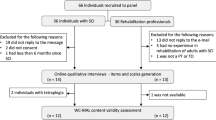Abstract
Study design:
One-week retest methodological study.
Objectives:
To assess the reliability and validity of the wheelchair outcome measure (WhOM) in a sample of individuals with spinal cord injury (SCI).
Setting:
Vancouver, British Columbia, Canada.
Methods:
The WhOM measures the impact of wheelchair interventions on a user's self-selected participation outcomes. The WhOM was administered to 50 participants on two occasions by the same rater, 1 week apart, to assess test-retest reliability. To determine inter-rater reliability, the WhOM was administered a third time approximately 72 h later by a different rater. Validity was evaluated by correlating scores from the WhOM with scores from the Assessment of Life Habits (LIFE-H).
Results:
The test-retest intraclass correlation coefficients (ICC2, 2) for the WhOM satisfaction (Sat) and WhOM importance (Impt) × Sat scores were 0.83 (95% confidence interval (CI), 0.72–0.90) and 0.88 (95% CI, 0.79–0.93), respectively. The inter-rater ICC for the WhOM Sat and WhOM Impt × Sat scores were 0.91 (95% CI, 0.85–0.95) and 0.90 (95% CI, 0.83–0.94), respectively. As hypothesized, most scores on the WhOM were fair to moderate (r=0.3–0.5) and positively correlated with scores on the LIFE-H.
Conclusion:
The WhOM is a new outcome measure that demonstrates good reliability and validity among individuals with SCI. It is designed to assist wheelchair users identify and evaluate the impact of wheelchair interventions on participation level outcomes. The WhOM may be applicable for clinical- or research-oriented purposes.
Similar content being viewed by others
Log in or create a free account to read this content
Gain free access to this article, as well as selected content from this journal and more on nature.com
or
References
New PW . Functional outcomes and disability after nontraumatic spinal cord injury rehabilitation: results from a retrospective study. Arch Phys Med Rehabil 2005; 86: 250–261.
Mann WC, Hurren D, Charvat B . Problems with wheelchair experienced by frail elders. Technol Disabil 1996; 5: 101–111.
Kittel A, Di Marco A, Stewart H . Factors influencing the decision to abandon manual wheelchairs for three individuals with a spinal cord injury. Disabil Rehabil 2002; 24: 106–114.
World Health Organization. International Classification of Functioning, Disability and Health. World Health Organization: Geneva, 2001.
Boschen KA, Miller WC, Noreau L, Wolfe DL, McColl MA, Martin-Ginis KA et al. Community reintegration following spinal cord injury. In: Eng JJ, Teasell RW, Miller WC, Wolfe DL, Townson AF, Hsieh JTC (eds). Spinal Cord Injury Rehabilitation Evidence, Vol 2.0 ICORD: Vancouver, BC, 2008.
Cardol M, de Hoon RJ, de Jong BA, van den Bos GA, de Groot IJ . Psychometric properties of the impact on participation and autonomy questionnaire. Arch Phys Med Rehabil 2001; 82: 210–216.
Noreau L, Fougeyrollas P, Post M, Asano M . Participation after spinal cord injury: the evolution of conceptualization and measurement. J Neurol Phys Ther 2005; 29: 147–156.
Mortenson WB, Miller WC, Auger C . Issues for the selection of wheelchair-specific activity and participation outcome measures: a review. Arch Phys Med Rehabil 2008; 89: 1177–1186.
Mortenson WB, Miller WC, Miller-Polgar J . Measuring wheelchair intervention outcomes: development of the wheelchair outcome measure. Disabil Rehabil 2007; 2: 275–285.
Xu G, Meyer JS, Thornby J, Chowdhury M, Quach M . Screening for mild cognitive impairment (MCI) utilizing combined mini-mental-cognitive capacity examinations for identifying dementia prodromes. Int J Geriatr Psychiatry 2002; 17: 1027–1033.
Donner A, Eliasziw M . Sample size requirements for reliability studies. Stat Med 1987; 6: 441–448.
Portney LG, Watkins MP . Foundations of clinical research applications to practice, 3rd edn. Prentice Hall Inc: NJ, 2009.
Auger C, Demers L, Gelinas I, Routhier R, Mortenson WB, Miller WC . Reliability and validity of telephone administration of the wheelchair outcome measure for middle-aged and older users of power mobility devices. J Rehabil Med 2010; 42: 574–581.
Noreau L, Desrosiers J, Robichaud L, Fougeyrollas P, Rochette A, Viscogliosi C . Measuring social participation: reliability of the LIFE-H in older adults with disabilities. Disabil Rehabil 2004; 26: 346–352.
Desrosiers J, Noreau L, Robichaud L, Fougeyrollas P, Rochette A, Viscogliosi C . Validity of the assessment of life habits in older adults. J Rehabil Med 2004; 36: 177–182.
Juster FT, Stafford FP (eds). Time, Goods, and Well-Being. Institute for Social Research: MI, 1987.
Landis JR, Koch GG . The measurement of observer agreement for categorical data. Biometrics 1977; 33: 159–174.
Andresen EM . Criteria for assessing the tools of disability outcomes research. Arch Phys Med Rehabil 2000; 81 (Suppl 2): S15–S20.
Guyatt GH, Berman LB, Townsend M, Taylor DW . Should study subjects see their previous responses? J Chron Dis 1985; 38: 1003–1007.
Noureau L, Fougeyrollas P . Long-term consequences of spinal cord injury on social participation: the occurrence of handicap situations. Disabil Rehabil 2000; 22: 170–180.
Acknowledgements
Funding for this study was provided by the British Columbia Neurotrauma Foundation. During the tenure of this grant, the Canadian Foundation of Health Institutes and Michael Smith Foundation for Health Research provided salary support for Drs Miller and Mortenson.
Author information
Authors and Affiliations
Corresponding author
Ethics declarations
Competing interests
The authors declare no conflict of interest.
Rights and permissions
About this article
Cite this article
Miller, W., Garden, J. & Mortenson, W. Measurement properties of the wheelchair outcome measure in individuals with spinal cord injury. Spinal Cord 49, 995–1000 (2011). https://doi.org/10.1038/sc.2011.45
Received:
Revised:
Accepted:
Published:
Issue date:
DOI: https://doi.org/10.1038/sc.2011.45
Keywords
This article is cited by
-
Feasibility of the trial procedures for a randomized controlled trial of a community-based peer-led wheelchair training program for older adults
Pilot and Feasibility Studies (2018)
-
Feasibility of a Systematic, Comprehensive, One-to-One Training (SCOOT) program for new scooter users: study protocol for a randomized control trial
Trials (2017)



